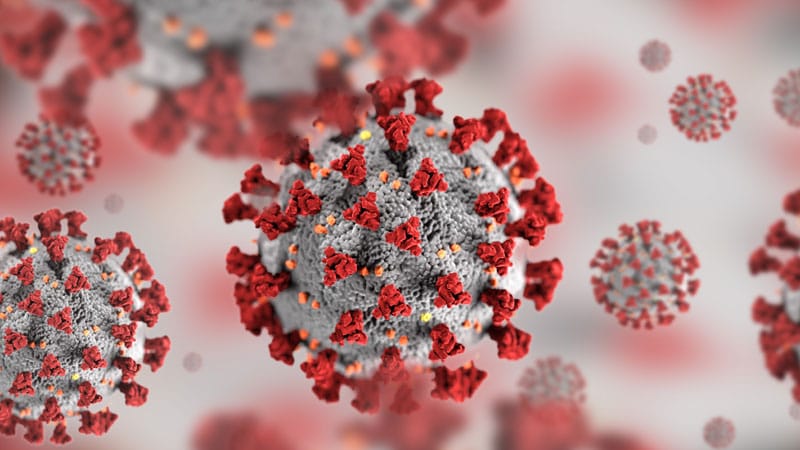Researchers have discovered a “weak spot” on the spike protein of the major SARS-CoV-2 variants, as well as a specific antibody fragment that attaches there to neutralize the virus.
This discovery could pave the way for developing an antibody treatment that is effective against current and future strains of the virus.
The study by Dhiraj Mannar, an MD/PhD student at the University of British Columbia (UBC), Vancouver, British Columbia, Canada, and colleagues was published online August 18 in Nature Communications.
Neutralizing Viral Variants
In a study published earlier this year in Science, Sriram Subramaniam, PhD, a professor of biochemistry and molecular biology at UBC’s faculty of medicine, and colleagues were the first to report the structure of the contact zone between the Omicron spike protein and the human cell receptor ACE2, a finding that offered a molecular explanation for the enhanced viral fitness of the Omicron variant.
For the current research, the investigators used cryo-electron microscopy (cryo-EM) imaging to study the epitope (the part of the virus to which an antibody binds) of SARS-CoV-2 variants. The investigators collaborated with another team led by Mitko Dimitrov, PhD, and Wei Li, PhD, at the University of Pittsburgh, Pittsburgh, Pennsylvania, that screened antibody libraries and tested their effectiveness against SARS-CoV-2 variants.
“We describe an antibody fragment (VHab6) that neutralizes all major variants, including the recently emerged BA.1 and BA.2 Omicron subvariants, with a unique mode of binding revealed by cryo-EM studies,” the researchers wrote.
“Our results provide mechanistic insights into the structural, functional, and antigenic consequences of SARS-CoV-2 spike mutations and highlight a spike protein vulnerability that may be exploited to achieve broad protection against circulating variants,” they added.
The SARS-CoV-2 viruses that cause COVID-19 “evolve over time and are looking to be better in infecting and replicating, and they undergo mutations to evade the immune system,” Subramaniam explained to Medscape Medical News in an interview.
The virus attaches to and infects human cells via its spike proteins, and the Omicron variant has 37 spike protein mutations, Subramaniam added.
The epitope described in the current study is outside of the hot spots for mutation, which is likely why the site has not mutated much over time.
“The Holy Grail,” said Subramaniam, “would be if you could take out the variants from the past and variants yet to come in the future.”
Master Key for Mutations
“Antibodies attach to a virus in a very specific manner, like a key going into a lock,” Subramaniam explained in a statement from UBC. “But when the virus mutates, the key no longer fits. We’ve been looking for master keys — antibodies that continue to neutralize the virus even after extensive mutations,” he said.
The researchers found that the antibody fragment VHab6 is the “master key” to SARS-CoV-2. The fragment was effective against the Alpha, Beta, Gamma, Delta, Kappa, Epsilon, and Omicron BA.1 and BA.2 variants. VHab6 neutralizes the virus by attaching to the epitope on the spike protein and blocking the virus from entering human cells, said Subramaniam.
The real proof, he added, would be to see whether this antibody fragment is effective against the newer BA.4 and BA.5 Omicron variants. The researchers plan to investigate this question.
It also remains for others to build on these basic science findings to develop a potential antibody treatment for COVID-19. Several antibody treatments exist, but they have reduced effectiveness against highly mutated newer variants of the virus, said Subramaniam.
Having an antibody that is safe and effective against new and emerging SARS-CoV-2 variants would be another tool in the toolbox to fight COVID-19, along with vaccinations and antiviral drugs like Paxlovid.
‘Major Step Forward’
The study findings are “a major step forward” in the fight against COVID-19, Matthew Miller, PhD, director of the DeGroote Institute for Infectious Disease Research at McMaster University in Hamilton, Ontario, Canada, told Medscape in an interview. Miller was not involved in the research.
The group “identified an epitope on spike proteins even in Omicron, by far the most evolved variant,” and found a “cool antibody” that seemed to be effective in all the variants, said Miller.
The next steps would be for a drug company to undertake clinical trials to demonstrate the safety and efficacy of this antibody, he said. It would also need to determine dosing and feasibility.
Antibody therapies, such as those developed for rheumatoid arthritis or irritable bowel syndrome, Miller noted, need to be administered at relatively low doses to be economically feasible.
Future research could also investigate prophylactic use of antibody therapies to prevent COVID-19 in, for example, frail, elderly people in long-term care, he added.
Subramaniam is the founder and CEO of Gandeeva Therapeutics. Mannar and Miller reported no relevant financial disclosures.
Nat Commun. Published online August 18, 2022. Full text.
For more news, follow Medscape on Facebook, Twitter, Instagram, and YouTube.
Source: Read Full Article
